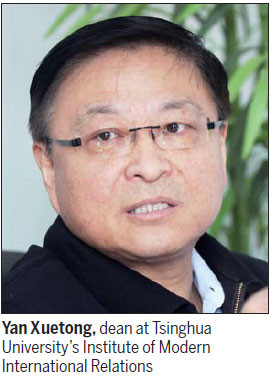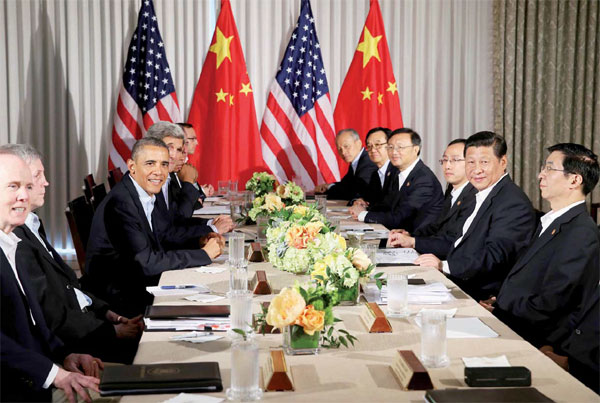Peaceful competition between China, US is possible: Expert

| President Xi Jinping and US President Barack Obama meet at the Annenberg Retreat of Sunnylands, California, on June 8, 2013. Yao Dawei / Xinhua |
It serves no one's interest to let bilateral relationship suffer
Yan Xuetong, a leading Chinese foreign policy scholar, visited the United States in late May to find out whether the downturn in China-US relations, as felt by many, is going to be a short-term or long-term trend, and whether such a downturn is accidental or premeditated.
He did not get a clear answer after talking over three days to a wide spectrum of people including experts and government officials. "They didn't agree on when the relationship started to improve and when it started to deteriorate," says Yan, dean at Tsinghua University's Institute of Modern International Relations.
"My feeling is that such a downturn is not a premeditated scheme," he says, adding that this is actually a positive sign.
Yan's trip came nearly a year after the historic shirt-sleeves summit between Chinese President Xi Jinping and US President Barack Obama at Sunnylands, California, when the two leaders vowed to build a new type of major power relationship that defies the historical rivalry between a rising power and the existing power.
Yan believes that such a consensus reflects the hope by the two leaders to avoid all-out military confrontation, especially when accidents and small clashes happen.
While competition between China and the US has increased over the years with China's rise, Yan believes peaceful competition between the two nations is possible.
He laid his premise on nuclear deterrence, which had prevented war between the Soviet Union and the US during the Cold War. And such deterrence is still valid, given that no other superior weaponry can change it.
Meanwhile, the ideological battle between China and the US is nothing like the Cold War because China has embraced a market economy. "Despite their differences on human rights issues, ideology is not the key for strategic competition between China and the US," Yan says.

Finally, globalization has also rendered any containment policy useless. While France and Germany went to WWI with each other despite their interdependent economies, Yan believes today's economies are more than interdependent, they are simply interwoven.
Because of all these factors, Yan believes peaceful competition between the two nations is possible if both governments adopt rational policies.
In Yan's eyes, both governments realize that it serves no one's interest to let their relationship suffer. At the same time, it's impossible for the relationship to be the best in the world, either.
"So we find the relationship in a position between the best and the worst Human efforts can only move it a bit toward the best or the worst but cannot decide the nature of the relationship," he said.
Paul Haenle, director of the Carnegie-Tsinghua Center based in Beijing, expressed his concern that the problems in the relationship are beginning to define the relationship.
"There is not enough good (things) to talk about. I think leaders at the highest level, in China and the United States, need to begin to address that," he says.
Haenle believes the leaders need to figure out how to move forward the concept of a new type of major power relationship and how the two countries are going to enhance cooperation in areas where they have common interests.
"We haven't really done that yet," he said.
Haenle cited the wisdom of his undergraduate students at Tsinghua University who proposed the two countries focus together on eradicating childhood diseases or a joint mission to Mars as part of efforts to put the relationship on a positive track.
Yan thought the recent setback in the relationship was normal because both sides still don't have experience in the new type of relationship between a rising power and an existing one.
The China-US Strategic and Economic Dialogue in Beijing in July will provide a new opportunity for the two sides to sit down and discuss how to take concrete steps, including issues of cyber security after the US Justice Department's indictment last month of five People's Liberation Army officers for cyber theft, according to Yan.
Many worry that the indictments and the subsequent strong reaction from China will hurt the mood for cooperation before an important bilateral meeting, which will be headed by Secretary of State John Kerry and Secretary of the Treasury Jack Lew on the US side and Vice-Premier Wang Yang and State Councilor Yang Jiechi on the Chinese side.
Haenle reminded people to also look at the US-China relationship in the context of their 35 years of diplomatic ties.
"So if you look at that context, the trajectory of the relationship has been on an upward curve," he says.
Yan dismissed Western accusations of a China threat, saying that China has not been involved in any war since the early 1980s. But he believes that many in the US and the West will keep talking about a China threat as long as China does not become a member of the Western club.
"It's not how China behaves, it's whether China joins this Western club or not," Yan says.
While a lack of trust between China and the US has been a serious concern for China-US relationship, Yan believes trust is not really necessary for cooperation given that the US, the United Kingdom and the Soviet Union cooperated without any trust during the WWII. When Mao Zedong shook hands with (Richard) Nixon, there was not much trust, he says.
Such cooperation in the past and more is based purely on shared interests, rather than trust and shared values, according to Yan.
Shen Dingli, a professor and associate dean at Fudan University's Institute of International Studies, says China and the US can cooperate without trust, but more likely they cannot cooperate on critical issues without trust.
Yan believes many problems are caused by exceedingly high expectation. So when the two countries cannot cooperate, they start to blame each other for a lack of trust.
To Yan, both sides need a common definition of the new type of relationship, even without trust.
"The precondition is that we should be very frank with each other that there is no trust between us," he says.
"Let's forget trust. Without trust, we can still survive. Without trust, we can still cooperate, and without trust, maybe we cooperate better."
chenweihua@chinadailyusa.com
(China Daily European Weekly 06/13/2014 page6)
Today's Top News
- Takaichi must stop rubbing salt in wounds, retract Taiwan remarks
- Millions vie for civil service jobs
- Chinese landmark trade corridor handles over 5m TEUs
- China holds first national civil service exam since raising eligibility age cap
- Xi's article on CPC self-reform to be published
- Xi stresses improving long-term mechanisms for cyberspace governance































